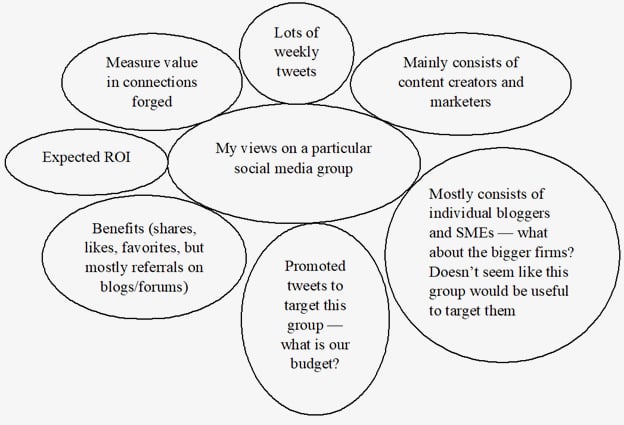Are people around you constantly extolling the benefits of metrics and analytics?
Web analytics, digital analytics, social media analytics, the list goes on. Yes, we get it. Metrics and ROI are important.
But, are you feeling overwhelmed? Are you unsure about where to start, or which metrics to analyze in relation to your specific business context?
The problem lies in the misconception that analytics begins with metrics. In reality, analytics should start with a systemic or holistic examination of, first, the organizational situation (problem) that precipitated the need for analytics, and, second, your own subjective role within the analytics process.
To learn about how to do so, especially in the context of social media, please read on.
Analytics Are Subjective, Not Objective
In typical analytics—let's say social media analytics—we make an assumption that the data and social media groups are "out there," waiting to be analyzed.
That is not entirely accurate. Social network data, like all social data, is not consistent, coherent, or predefined. Such data is selectively harvested by analysts and marketers like you, according to your subjective judgments and preconceived notions.
You make many subjective judgments when analyzing a social media group that is important to your business.
First, you must decide on which relationships in the group to focus on based on the context and goals of your inquiry. For example, in a Twitter group, you could pick between the follower relationship, the retweet relation, the "favorited tweet" relation, or the mention relation.
You must also pick the aspects of the social group structure to focus the analysis on (e.g., network density).
Also, you might be interested in identifying top influencers in certain social media groups to engage in influencer marketing. "To win the content marketing game, brands need to focus more on optimized, personalized, and influencer activated content experiences," the CEO of TopRank Marketing is quoted as saying in HubSpot's Not Another State of Marketing Report.
Before identifying top influencers, you as an analyst must decide on what your definition of a "top influencer" is. Is it someone who gets mentioned a lot by others in the group, or is it someone who shares lots of content? Is it someone who is connected to lots of other influencers, or is it a user who connects members of the group who are otherwise disconnected from the membership at large?
Those sorts of judgments in analytics are made based on your interpretation of the goals and context of the particular inquiry, your understanding of the social media group under analysis, and your past experiences with similar projects.
You will view the social media group being analyzed from within your organizational context and subjective frame of reference. Your subjective perceptions will be influenced by your prior experiences, biases, and assumptions. Your subjective frame of reference will influence the initial assumptions regarding the group, the selection of the relationship to structure the analysis around, the choice of which aspect of the social network structure to focus on, the choice of metrics to be used to measure influence, and the significance of the results in the context of the social media group and the organization that you belong to.
Accordingly, analytics is not objective. It is subjective.
So, how important is it for you to learn more about your subjective perceptions on both the social media group being analyzed and the business context?
It is vital, because it can help you gain a more systemic or holistic understanding of the situation under analysis before you decide which metrics to track. It can also help you to explain the business value of tracking particular metrics to your managers.
So how can you set about doing so? Here are some suggestions.
How to Conduct Holistic Analytics
1. Think of analytics as a social process or a group activity
Each analyst will have their own subjective view of the organizational context and goals for the analysis. If you want to generate a holistic understanding, you have to bring those divergent views together and look at them as a whole. To do so, we need analysts to define and discuss their subjective views.
2. Visually represent the subjective perceptions of analysts
We all know what we are thinking. But, if we are to truly understand and discuss different views, those views must be displayed as visual artifacts.
Here is a systems map that was created by an analyst to represent his views on a particular social media group. The maps drawn by individual analysts should be shared and discussed among a group of analysts.

3. Discuss! Discuss! Discuss!
Discussing your individual systems maps (or other visual artifacts) representing the views of analysts can help surface issues about the organizational context and social media group that were previously unknown. Such discussions help clarify the differences in each analyst's motivation, and also highlight common ground.
Holistic understanding is achieved when differences are reconciled and analysts can move towards a group-level view of the situation to be analyzed.
4. Use the following questions to holistically explore your subjectivity as an analyst
- What are your objectives for doing this analytics project?
- What benefits could you potentially gain from doing the project?
- What risks could you potentially be exposed to by conducting the project?
- Is there anything or anyone in your wider environment who could potentially stop or impede your inquiry or the changes you would like to make based on the results of the inquiry?
- Who are the stakeholders in your organization or wider environment that would be interested in or affected by the inquiry? How would they be affected?
- Who else is involved in the project, and how do they engage with you and each other?
- What level of formal authority do you have to make changes to the situation under the analysis or its wider environment?
- In addition to any formal authority, do you have any informal resources at hand that you could use to make changes in the situation?
- What types of changes or transformations would you hope to make to the situation under analysis or its wider environment based on the results of your inquiry?
- What do you hope to learn from the project?
The above questions can be customized to suit different types of analytics projects. For example, when analyzing a social media group, you could ask your questions as follows:
- What are your objectives for analyzing this social media group?
- What benefits could you potentially gain from analyzing the group?
- What risks could you potentially be exposed to by analyzing the group?
- Is there anything or anyone in your wider environment who could potentially stop or impede your inquiry or the changes you would like to make to the social media group or that wider environment based on the results of the inquiry?
- Who are the stakeholders in your wider environment that would be interested in or affected by the inquiry? How would they be affected?
- Who else is involved in the project, and how do they engage with you and each other?
- What level of formal authority do you have to make changes related to how your company engages with this social media group?
- In addition to any formal authority, do you have any informal resources to hand that you could use to make changes?
- What types of changes would you hope to make regarding how your company engages with this social media group based on the results of your inquiry?
- What do you hope to learn from the project?
* * *
There are a few major takeaways from this article.
First, as analysts and marketers, we must holistically learn about the situation that precipitated the need for analytics and its wider business context before considering which metrics to track.
Second, acknowledge that analytics is not entirely objective. We are called on to make many subjective judgments during the analytics process. By recognizing our subjective views and creating opportunities to define and discuss those views, we can generate a more systemic and holistic, group-level view of the object or situation under analysis and its business context.
Third, recognize that analytics should be conducted as an interactive group activity. When analytics is conducted as an interactive social process, we can discuss the individual perspectives of analysts and identify new insights that could emerge when the individual views are considered in combination with each other.
So, if you are confused about where to start your analytics process, which metrics to track, and how to identify insights that make a difference... start by thinking holistically.
More Resources on Holistic Analytics and Tracking the Right Metrics
Five Web Analytics Tools to Help You Optimize and Measure Marketing ROI
How to Measure Your Social Media Marketing Campaigns: Six Sets of Useful Metrics
Advanced Real-Time Analytics Will Get You the Answers That Google Analytics Can't





